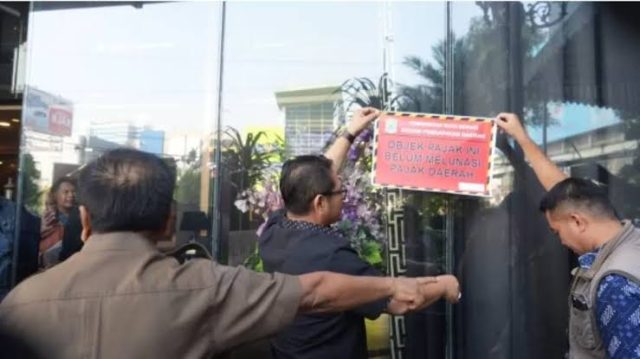BEKASI CITY – The Bekasi City Government, through the Regional Revenue Agency (Bapenda), has enforced the law by issuing a “non-compliant taxpayer” sticker to the Grand Amaroossa Hotel in Bekasi last Thursday.
It is known that one of the luxury hotels in Bekasi City has not settled its regional tax obligations from the February 2024 tax period until June 2025. This is based on the Taxpayer Ledger at the Bekasi City Regional Revenue Agency.
As of the latest observation on Friday (1/08/2025), the sticker from the Bekasi City Government stating “this tax object has not paid regional taxes” remains affixed to the hotel’s glass entrance.
Meanwhile, Commission III of the Bekasi City DPRD has urged the Bekasi City Government to involve the Bekasi District Prosecutor’s Office to take action against tax evaders in the city.
The tax evaders in question are delinquent taxpayers who intentionally do not pay their taxes to the Bekasi City Government’s regional treasury. Among them are several hotels and restaurants in Bekasi City.
“It is clear that restaurant and hotel taxes are essentially public money entrusted when people dine at restaurants or stay at hotels. Therefore, we, the DPRD, request the Bekasi City Government to involve the Prosecutor’s Office to take action against delinquent taxpayers,” said a member of Commission III of the Bekasi City DPRD.
According to them, this step is necessary to maximize Regional Original Revenue (PAD) and create a deterrent effect for delinquent taxpayers.
“Involving law enforcement is also part of the government’s firmness in enforcing regulations. It is expected to have a deterrent effect on delinquent taxpayers,” they added.
As of this report, there has been no official statement from the hotel regarding the issuance of the “unpaid tax” sticker by the Bekasi City Government.
Grand Amaroossa Hotel
The **Grand Amaroossa Hotel** is a luxurious and historic hotel known for its elegant architecture and high-end hospitality. While specific details about its origins are unclear, it is often associated with a blend of traditional charm and modern amenities, catering to elite travelers. The hotel’s name and grandeur suggest a legacy tied to opulent accommodations, possibly in a culturally rich or scenic location.
Bekasi City Government
The Bekasi City Government oversees the administration of Bekasi, a rapidly growing city in West Java, Indonesia. Originally part of the larger Bekasi Regency, it became an independent city in 1997, reflecting its urbanization and economic significance. Today, it plays a key role in managing infrastructure, public services, and development in one of Jakarta’s major satellite cities.
Regional Revenue Agency (Bapenda)
The Regional Revenue Agency (Bapenda) is a government institution in Indonesia responsible for managing and collecting regional taxes and retributions at the provincial or regency level. Established to support regional autonomy, Bapenda plays a key role in funding local development projects and public services. Its functions include tax administration, enforcement, and ensuring compliance with regional financial regulations.
Bekasi City DPRD
The Bekasi City DPRD (Dewan Perwakilan Rakyat Daerah) is the legislative council of Bekasi City, West Java, Indonesia, responsible for local governance and policy-making. Established following the city’s official formation in 1997, the DPRD plays a key role in regional development and representing the interests of Bekasi’s residents. The council works alongside the mayor to oversee public services, budgets, and regulations in one of Indonesia’s rapidly growing urban areas.
Bekasi District Prosecutor’s Office
The Bekasi District Prosecutor’s Office is a government institution in Bekasi, Indonesia, responsible for legal enforcement and prosecution within its jurisdiction. Established as part of Indonesia’s judicial system, it plays a key role in upholding justice by investigating and prosecuting criminal cases. While specific historical details about its founding are limited, it operates under the broader framework of Indonesia’s Attorney General’s Office, which was formalized after the country’s independence in 1945.






